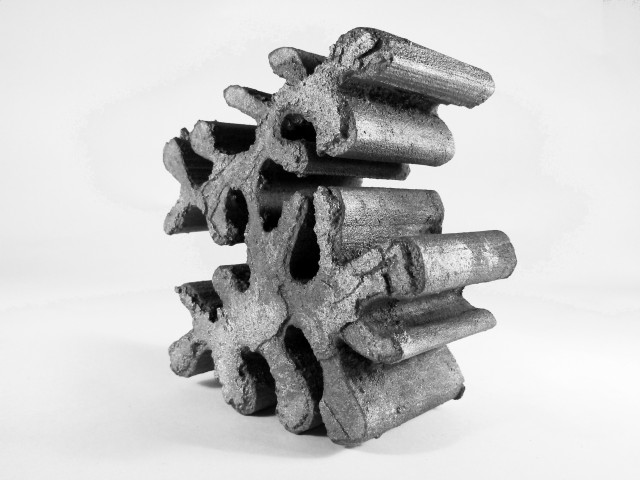Reviewing Aluminum Foundry Wisconsin and its role in custom casting
Understanding the Perks and Innovations in the Aluminum Foundry Industry
The Aluminum Foundry sector plays an essential function in modern production. Its light-weight residential or commercial properties especially enhance gas efficiency, specifically in vehicle and aerospace sectors. Furthermore, Aluminum's resistance to deterioration guarantees durability in different applications. As the market advances, innovations such as advanced recycling and additive manufacturing are reshaping production techniques. Checking out these innovations discloses not just the advantages yet additionally the difficulties in advance for Aluminum shops in a swiftly altering market.
The Lightweight Advantage of Aluminum
Aluminum's light-weight nature supplies substantial benefits across different markets, especially in production and transportation. Its reduced thickness allows for the production of components that are much easier to manage and set up, leading to decreased labor costs and improved effectiveness. In the automobile sector, lighter vehicles add to improved gas economic situation and reduced emissions, aligning with international sustainability goals. In aerospace, the use of Aluminum minimizes the overall weight of aircraft, which is vital for enhancing efficiency and decreasing operational costs.
Furthermore, Aluminum's lightweight residential or commercial properties promote ingenious layouts that were previously unfeasible with heavier products. This flexibility allows suppliers to develop complex shapes and frameworks while preserving structural honesty. Overall, the light-weight advantage of Aluminum not just enhances item efficiency yet also drives advancements in innovation and layout, making it a preferred product in various applications.
Corrosion Resistance and Longevity
The Aluminum Foundry industry is renowned for creating materials with superior rust resistance, making them excellent for various applications. This residential property, combined with improved structural stability, adds to the long-lasting performance benefits that Aluminum components offer. Because of this, sectors increasingly rely upon Aluminum to meet demanding ecological problems without endangering high quality.
Superior Deterioration Resistance
While numerous steels face considerable difficulties from ecological aspects, Aluminum sticks out for its superior corrosion resistance, making it a preferred choice in many applications. This property is primarily due to a natural oxide layer that bases on the Aluminum surface area, supplying an obstacle versus dampness and corrosive representatives. Unlike other metals that might corrosion or weaken over time, Aluminum maintains its honesty also in severe atmospheres, such as seaside areas or industrial settings. Additionally, its lightweight nature incorporated with deterioration resistance makes it optimal for applications in aerospace, vehicle, and marine industries. On the whole, Aluminum's exceptional resilience not just boosts product durability but additionally minimizes upkeep expenses, providing an engaging benefit for suppliers and consumers alike.
Enhanced Architectural Stability
Designers and developers progressively identify the relevance of improved structural honesty in contemporary applications, where both corrosion resistance and toughness are critical. Aluminum alloys, recognized for their lightweight residential or commercial properties, likewise display phenomenal resistance to rust, making them suitable for rough atmospheres. The cutting-edge methods used in the Aluminum Foundry industry add substantially to generating parts with boosted sturdiness. Advanced casting processes and alloy structures are customized to fulfill details performance demands, making certain that structures can withstand severe problems without compromising honesty. Additionally, surface therapies and layers boost the lifespan of Aluminum products, even more minimizing damage over time. This focus on enhanced architectural integrity not only extends the functionality of materials yet additionally reduces maintenance costs, solidifying Aluminum's setting as a material of choice in different markets.
Resilient Efficiency Benefits
Long-lasting performance in Aluminum parts is largely associated to their superior corrosion resistance and resilience. Unlike lots of steels, Aluminum normally develops a protective oxide layer, which avoids rust and wear and tear in various environments, including marine and commercial settings. This fundamental building substantially prolongs the life expectancy of Aluminum products, minimizing upkeep and substitute prices. Additionally, the lightweight nature of Aluminum enhances its applicability throughout sectors without jeopardizing stamina. The material's resistance to use and tear also adds to its reliability sought after applications, making it an ideal option for automobile, aerospace, and construction markets. As sectors progressively prioritize sustainability and long life, Aluminum's efficiency benefits align with contemporary engineering demands, strengthening its role in cutting-edge manufacturing procedures.
Environmental Effect and Sustainability
 As the Aluminum Foundry sector develops, it significantly focuses on environmental effect and sustainability, identifying the demand for accountable techniques in the face of climate adjustment. Efforts to minimize waste and power intake are at the center, with lots of foundries embracing reusing initiatives to reclaim Aluminum scrap. This not just decreases resources use yet also significantly lowers power expense, as recycled Aluminum requires just a fraction of the energy contrasted to primary production.
As the Aluminum Foundry sector develops, it significantly focuses on environmental effect and sustainability, identifying the demand for accountable techniques in the face of climate adjustment. Efforts to minimize waste and power intake are at the center, with lots of foundries embracing reusing initiatives to reclaim Aluminum scrap. This not just decreases resources use yet also significantly lowers power expense, as recycled Aluminum requires just a fraction of the energy contrasted to primary production.Additionally, advancements in emissions manage innovations are being implemented to decrease air toxins, lining up operations with stricter environmental guidelines. Factories are likewise discovering different power resources, such as solar and wind, to power their facilities sustainably. By promoting partnership with stakeholders, the market aims to develop ingenious services that enhance ecological stewardship. Collectively, these initiatives highlight a commitment to reducing the Aluminum Foundry's carbon impact while advertising a circular economic situation within the production market.
Advanced Production Techniques
 Transforming production procedures, the Aluminum Foundry industry is progressively incorporating sophisticated production methods to boost performance and precision. Techniques such as computer system numerical control (CNC) machining and additive production have become necessary components in enhancing production process. CNC machining enables high-precision element construction, considerably reducing product waste and manufacturing time. On the other hand, additive production opens new methods for complex geometries and lightweight layouts that were previously tough to achieve.
Transforming production procedures, the Aluminum Foundry industry is progressively incorporating sophisticated production methods to boost performance and precision. Techniques such as computer system numerical control (CNC) machining and additive production have become necessary components in enhancing production process. CNC machining enables high-precision element construction, considerably reducing product waste and manufacturing time. On the other hand, additive production opens new methods for complex geometries and lightweight layouts that were previously tough to achieve.Additionally, the release of automation and robotics in Aluminum foundries enhances procedures, minimizes human error, and enhances employee safety and security. These technologies promote a more responsive production atmosphere, allowing suppliers to adapt rapidly to market demands. The combination of innovative simulation software additionally enhances the design and screening stages, causing superior item top quality. Collectively, these techniques not only boost operational effectiveness however likewise foster technology, positioning the Aluminum Foundry sector at the center of modern-day production.
Developments in Reusing Procedures
The Aluminum Foundry industry is not just progressing in making methods however is also making significant strides in reusing procedures. Advancements are arising to enhance the performance of reusing methods, decreasing power intake and go right here improving sustainability. Advanced arranging technologies, such as automated optical sorting, enable the identification and separation of Aluminum from other products with high precision. This leads to a greater top quality of recycled Aluminum, which is necessary for preserving the integrity of the last items.
Additionally, closed-loop recycling systems are being executed, permitting producers to recycle Aluminum scrap within their own manufacturing procedures. This reduces waste and advertises a circular economic climate. In addition, research study right into new recycling strategies, such as hydrometallurgical processes, supplies the capacity for recouping Aluminum from complicated waste streams. These technologies not only add to decreasing the carbon footprint of the Aluminum Foundry sector however additionally reinforce its economic viability in a significantly environmentally aware market.
Applications Throughout Different Industries
Countless industries are progressively acknowledging the flexibility and advantages of Aluminum Foundry items, leading to extensive applications throughout industries such as vehicle, aerospace, consumer, and building and construction products. In the automotive market, Aluminum castings add to light-weight automobile designs, enhancing fuel effectiveness and performance. Aerospace makers make use of Aluminum parts for their strength-to-weight proportion, essential for airplane frameworks and elements.
In building and construction, Aluminum is preferred for its toughness and resistance to deterioration, making it ideal for window frames, roof, and architectural assistances. Customer items additionally benefit from Aluminum Foundry products, as seen in kitchenware, electronics, and packaging, where light-weight and recyclable products are essential.
The flexibility of Aluminum Foundry methods enables accurate specifications and intricate designs, catering to the varied demands of these markets. Consequently, Aluminum Foundry products are ending up being important to contemporary manufacturing procedures throughout numerous markets.
Future Trends in Aluminum Foundries
As industries proceed to progress, Aluminum foundries are positioned to accept several essential trends that assure to improve effectiveness and sustainability. One popular fad is the boosting adoption of electronic modern technologies, consisting of automation and expert system, which enhance operations and improve quality assurance. On top of that, the push in the direction of sustainable practices is leading shops to buy reusing modern technologies, greatly minimizing waste and energy usage.
 An additional emerging special info pattern is the usage of advanced alloys and products, dealing with the growing need for long lasting and light-weight components across numerous industries (Aluminum Foundry). In addition, the integration of additive manufacturing strategies is anticipated to change part design, using customization and reducing lead times
An additional emerging special info pattern is the usage of advanced alloys and products, dealing with the growing need for long lasting and light-weight components across numerous industries (Aluminum Foundry). In addition, the integration of additive manufacturing strategies is anticipated to change part design, using customization and reducing lead timesCooperation with research institutions is likewise expected to drive technology, as foundries seek to establish new processes and products. Aluminum Foundry. Jointly, these fads show a transformative future for the Aluminum Foundry sector, lining up with more comprehensive objectives of sustainability and efficiency
Often Asked Concerns
What Are the Normal Prices Linked With Aluminum Foundry Manufacturing?
The regular expenses connected with Aluminum Foundry production include raw materials, labor, energy, devices maintenance, and overhead expenses. These aspects jointly affect the general monetary investment required for efficient Aluminum casting operations.
Just How Does Aluminum Contrast to Other Metals in Stamina?
Aluminum, while lighter than numerous metals, shows outstanding strength-to-weight proportions. Compared to steel, Aluminum is less solid however uses superb deterioration resistance, making it a desirable selection in applications where weight and sturdiness are crucial.
What Safety and security Procedures Are in Place in Aluminum Foundries?
Precaution in Aluminum shops normally include obligatory personal safety devices, air flow systems to manage fumes, regular devices maintenance, training programs for workers, and adherence to stringent safety and security guidelines to lessen dangers related to liquified steel handling.
Exactly How Is Quality Assurance Managed in Aluminum Spreading Processes?
Quality control in Aluminum spreading processes includes strenuous assessments at various stages, consisting of basic material evaluation, process monitoring, and end product screening. Methods such as analytical procedure control and non-destructive testing assurance adherence to industry requirements.
What Qualifications Are Necessary for Aluminum Foundry Vendors?
The importance of accreditations for Aluminum Foundry distributors includes ISO 9001 for top quality administration, ISO 14001 for ecological management, and industry-specific criteria like ASTM and why not try this out SAE, guaranteeing conformity, safety, and dependability in making processes.
The Aluminum Foundry industry plays an important function in modern manufacturing. The Aluminum Foundry industry is renowned for creating products with superior corrosion resistance, making them excellent for various applications. Revolutionizing manufacturing processes, the Aluminum Foundry industry is progressively incorporating sophisticated production techniques to boost effectiveness and accuracy. The Aluminum Foundry sector is not just progressing in making methods yet is also making significant strides in recycling procedures. As industries continue to evolve, Aluminum foundries are poised to accept a number of vital fads that assure to boost performance and sustainability.